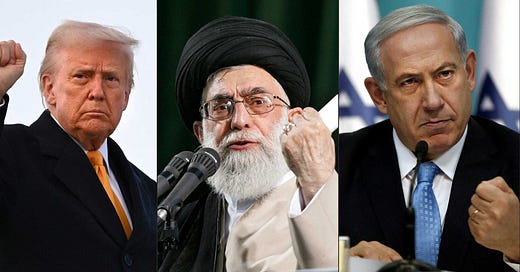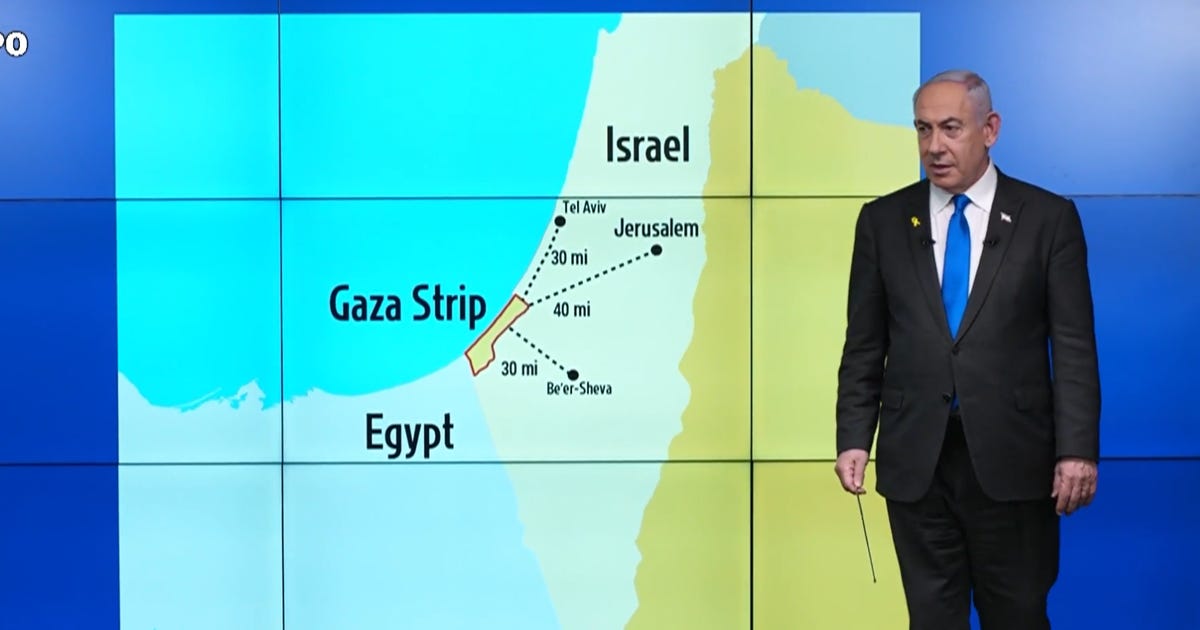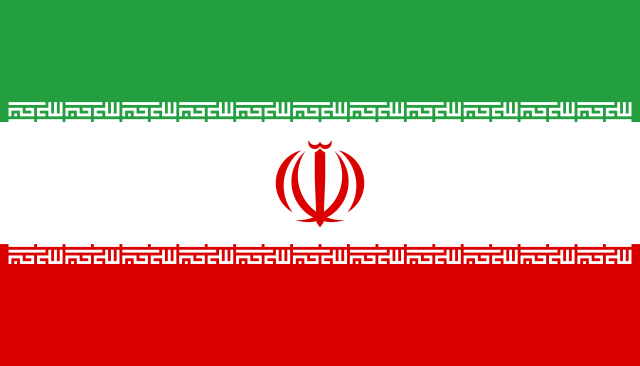[POST] Trump doesn't hold Israel's leash
When you outsource your foreign policy, your "running dogs" run wild
This is a reader-supported publication. I give it all away for free but could really use your support if you want me to keep doing this.
What we all underestimated: how badly a battered Iran wants out of this fight.
What we all still overestimate: Trump’s hold on Netanyahu.
What we keep on misunderestimating: Israel’s new-found hegemony over the region.
In short, by outsourcing America’s longstanding hegemonic role to Israel, the US no longer exhibits main character energy.
Main character energy is an informal Internet expression for self-assured bearing or behavior. The phrase is used both to compliment self-confidence as well as criticize its excesses.
I suspect we’re nowhere yet near Israel having spent all its MCE in this ongoing 10/7 Revenge Tour, and I completely understand.
Remember, per previous expressions of my logic here:
It's go time for Greater Israel
From the river to the sea, radical acceptance of what inevitably will be
Israel's desired regional ending-of-state
Regime change in Iran is the proximate/ultimate/only solution
[Reiterating and extending that logic] … the threat of Iran provides excellent diplomatic top cover for Israel’s ongoing eradication of Gaza as a threat vector-source. That de facto campaign of ethnic cleansing is far from over, so Israel is highly incentivized to keep the greater/scarier Iran dynamic first and foremost in our minds (i.e., the much-dreaded “wider regional war” that simply is not happening).
Just like Israel’s continued existence has long served as the Iranian regime’s raison d’être, the mullahs’ continued rule in Iran (and stubborn reach for the Bomb) now serves as Netanyahu’s raison d’etre — namely, his oft-declared “existential threat.” The deconstruction and annexation of Gaza will take many more months, likely keeping Netanyahu’s rule intact. Better to have the world’s attention fixated on Iran’s still-undecided fate than Gaza’s slow-motion execution.
We know Tehran wants this cease-fire to work, and that Trump is desperate for it (you can always spot his desperation when he tries to will things into being with his “magic spell” declarations on Truth Social — declarum ceasefiredom!). But Israel? Nobody on that team was asking for one.
Of course, Israel can always conditionally agree to it, then cite some horrendous transgression (or just-discovered infamy) and vow immediate revenge — almost a Netanyahu speciality. Beyond that, a targeted assassination of Khamenei (still on my bingo card) would certainly do the trick, locking Iran and Israel into months of ongoing turmoil. This is why Khamenei is hiding in his bunker like Hitler in the spring of 1945. Short of that, I would expect Israel to incrementally uncover evidence that Iran’s nuclear capacity survives in this or that way, necessitating continued strikes.
After all, Israel has now firmly established its new rules on “mowing the grass”: What was a regular decimation strategy focused on Iran’s proxies is now focused on Iran itself. Until recently, that rule-set meant Israel and Iran didn’t directly target the other’s homeland — even as the occasional assassination needed doing (mostly Israel killing Iranians). Now, direct military exchanges are the accepted new normal, tolerated only out of fear of the “wider regional war” bogeyman incessantly cited by Western security analysts.
Again, so long as that “wider regional war” is averted, Israel is pretty much free to continue its deconstruction of Gaza (and, ultimately, of the West Bank), but keeping that threat first and foremost in everybody’s mind requires continued conflict with Iran. On personal terms, Netanyahu keeps all those plates spinning or he’s gone from power.
Probably the most benign version of Netanyahu’s strategy would be to simply find unacceptable ANY Iran nuke deal orchestrated by the US and other superpowers — not to mention any conflict-ending peace deal. This, it seems to me, is easily accomplished by mandating that any such deals must be explicitly bilateral in nature — i.e., forcing Tehran to admit and diplomatically recognize Israel’s existence.
Think back to the dagger that Nixon and Kissinger sunk into Moscow’s chest in the form of the original SALT Treaty. From my 2009 book Great Powers:
Of course, it wasn’t enough for just the United States to understand and adhere to the notions of MAD [Mutually Assured Destruction]; we also had to convince the Soviets of this same logic. This effort took years, finally culminating in the signing of the first Strategic Arms Limitation Talks (SALT) treaty, as well as the Anti-Ballistic Missile Treaty, in May 1972 at the first of three historic summits between Richard Nixon and Soviet [General Secretary*] Leonid Brezhnev. By agreeing for the first time to limit the nature of its ideological death match with capitalism, the international Communist movement, as [Adam] Ulam states, “was finished.” Yes, there would be future double crosses and spy scandals and proxy wars in the Third World, but none of those events changed the essential correlation of forces — until Reagan threatened to do so with Star Wars in the early 1980s.
Point being, once Moscow signed its first nuclear treaty with Washington, it basically admitted to the world that communism could never win because it could never eliminate its champion, the United States. And, once it admitted that, then the Russian/Soviet peoples’ firm belief that the authoritarian regime they suffered under was necessary to prevent even worse suffering at the hands of the “evil” West was exposed as a lie. The whole Soviet logic of this being the only way to survive was shattered. From that point on, it was just a matter of waiting out the generational passing of the remaining Old Guard — namely, the Brezhnev cohort.
Now, one could say that much of Iran’s population have already made that mental leap, but nothing would expose that lie better than Iran being forced to cut a deal directly with Israel — again, admitting its existence by accepting it as a counterparty in a diplomatic deal.
If I am Netanyahu, I refuse to have Israel accept ANY deal that is not directly concluded between it and Iran. To me, that’s the essential prize of achieving military hegemony in the region: no more security deals cut by others with Israel’s direct enemies. If Iran wants out of this fight, it needs to sign a peace deal and/or nuclear deal that directly binds it to Israel’s continued existence.
That, to me, is an easy sell to the Israeli public: We can’t trust any deal underwritten by Europe, or the Russians, or the Chinese, or even the Americans. We can only trust a deal in which Iran is forced to admit and accept our existence. Anything short of that and all options will remain on the table because we remained convinced that Iran’s nuclear program survives in some unacceptable fashion.
This is where Netanyahu and Trump will butt heads, I think. Trump is convinced he is still the primary dealmaker — having tossed some chips into the pot with the bunker-busting strike so as to earn his seat at the table. But I think he’s wrong and I would be surprised if Israel accepted some deal between Washington and Tehran. If that was good enough, then the Obama nuclear deal would have been good enough.
So, again, if I’m Netanyahu, I make a direct bilateral deal the ONLY acceptable outcome, expecting full well that Khamenei CANNOT swallow that existential defeat of the “revolution,” and then just wait for the next “trolley car” (Iranian aggression or misstep or proxy action) to come down the tracks so I can hop back on the war line that keeps the “wider regional conflict” danger front and center while I finish off Gaza and set the West Bank’s fate in motion.
In sum, Netanyahu is far from his perceived finish line, which, on a personal basis for him, is without end. Plus, he’s on an amazing win streak, so why stop just because Tehran is ready to cry “uncle”?
Trump can promise to make Iran great again all he wants. Israel is already great and sure as hell ain’t inviting the Ayatollah to sit at that table.
ENDNOTE: Somehow, in that excerpt from Great Powers, the mistake got through editing of my labeling Brezhnev as President when he was Chairman of the Presidium and General Secretary of the party and was typically referred to by Nixon himself as “Mr. General Secretary.” A truly bonehead mistake I cannot believe I made. It could have happened in editing and I missed it, but either way, my mistake.










There’s a certain element of UDI in Israel’s approach here that underlines Trumpist commitment to reducing foreign commitments. But like with most Trump policy agendas, it’s self-contradictory. You can’t refuse the connectivity work (USAid, etc) and demand the seat at thr table connectivity provides. Buy now, refuse to pay later.